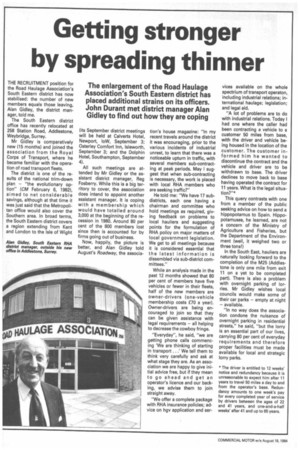Getting stronger by spreading thinner
Page 28

If you've noticed an error in this article please click here to report it so we can fix it.
The enlargement of the Road Haulage Association's South Eastern district has placed additional strains on its officers. John Durant met district manager Alan Gidley to find out how they are coping
THE RECRUITMENT position for the Road Haulage Association's South Eastern district has now stabilised: the number of new members equals those leaving, Alan Gidley, the district manager, told me.
The South Eastern district office has recently relocated at 258 Station Road, Addlestone, Weybridge, Surrey.
Mr Gidley is comparatively new (15 months) and joined the association from the Royal Corps of Transport, where he became familiar with the operation of road transport fleets.
The district is one of the results of the national trim-down plan — "the evolutionary option" (CM February 6, 1982), aimed to net considerable savings, although at that time it was just said that the Metropolitan office would also cover the Southern area. In broad terms, the South Eastern district covers a region extending from Kent and London to the Isle of Wight (its September district meetings will be held at CaIvens Hotel, Newport, loW, September 3; Osterley Comfort Inn, Isleworth, September 3; and the Dolphin Hotel, Southampton, September 4).
All such meetings are attended by Mr Gidley or the assistant district manager, Reg Fosberry. While this is a big territory to cover, the association does intend to appoint another assistant manager. It is coping with a membership which would have totalled around 3,000 at the beginning of the recession in 1980. Around 80 per cent of the 800 members lost since then is accounted for by firms going out of business.
Now, happily, the picture is better, and Alan Gidley told August's Roadway, the associa tion's house magazine: "In my recent travels around the district it was encouraging, prior to the various incidents of industrial unrest, to learn that there was a noticeable upturn in traffic, with several members sub-contracting at peak periods. May I suggest that when sub-contracting is necessary, the work is placed with local RHA members who are seeking traffic?"
He told me: "We have 17 subdistricts, each one having a chairman and committee who hold meetings as required, giving feedback on problems to local hauliers and suggesting points for the formulation of RHA policy on major matters of local government legislation. We get to all meetings because it is considered essential that the latest information is dissembled via sub-district committees."
While an analysis made in the past 12 months showed that 80 per cent of members have five vehicles or fewer in their fleets, half of the new members are owner-drivers (one-vehicle membership costs £70 a year). Owner-drivers are being encouraged to join so that they can be given assistance with legal requirements — all helping to decrease the cowboy fringe.
"Everyday", he said, "we are getting phone calls commencing 'We are thinking of starting in transport ...' We tell them to think very carefully and ask at what stage they are. As an association we are happy to give initial advice free, but if they mean to go ahead and get an operator's licence and our backing, we advise them to join straight away.
"We offer a complete package with RHA insurance policies; advice on hgv application and ser vices available on the whole spectrium of transport operaton, including industrial relations; international haulage; legislation; and legal aid.
"A lot of problems are to do with industrial relations. Today I had one where the caller had been contracting a vehicle to a customer 50 miles from base, with the driver and vehicle being housed in the location of the customer. The customer informed him he wanted to discontinue the contract and the vehicle and driver are to be withdrawn to base. The driver declines to move back to base having operated the contract for 11 years. What is the legal situation?"* This query contrasts with one from a member of the public seeking advice on how to send a hippopotamus to Spain. Hippopotamuses, he learned, are not a concern of the Ministry of Agriculture and Fisheries, but the Department of the Environment (well, it weighed two or three tons!) In the South East, hauliers are naturally looking forward to the completion of the M25 (Addlestone is only one mile from exit 11 on a yet to be completed part). There is also a problem with overnight parking of lorries. Mr Gidley wishes local councils would make some of their car parks — empty at night — available.
"In no way does the association condone the nuisance of overnight parking in residential streets," he said, "but the lorry is an essential part of our lives, carrying 80 per cent of everyday requirements and therefore proper facilities must be made available for local and strategic lorry parks.
* The driver is entitled to 12 weeks' notice and redundancy because it is unreasonable to expect him after 11 years to travel 50 miles a day to and from the operator's base. Redundancy amounts to one week's pay for every completed year of service by drivers between the ages of 22 and 41 years, and one-and-a-half weeks' after 41 and up to 65 years.








































































